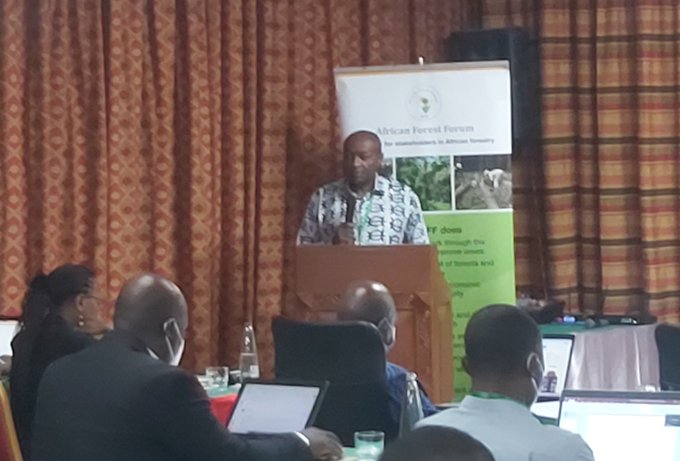|
Getting your Trinity Audio player ready...
|
By Baboloki Semele
Today, in the white and blue city in Kenya, Mombasa, African Forest Forum stakeholders are meeting via hybrid, a regional workshop to share information and experiences on challenges and opportunities in forest management for sustainable development in Africa in the context of climate change.
Addressing the delegates, during the official opening, the Executive Secretary of the African Forest Forum, Godwin Kowero, noted that forests and trees outside forests are resources that must be managed sustainably and used judicially to address the needs of people and improve the environment they live in.
Since its establishment in 2007, the African Forest Forum has embarked on several Pan-African initiatives that are related to how forests and trees outside forests support livelihoods on the continent, national incomes, and the environment at large.
He said against these backgrounds forest stakeholders have congregated in Mombasa, Kenya on a 5-day hybrid workshop in which findings from AFF work will be shared.
The focus will be on managing climate change in forestry and improving management and use of land and forest resources on the African continent.
He says with respect to managing climate change in African forestry, AFF has looked at how African countries are integrating climate change adaptation and mitigation options in the forestry sector and how the uptake of this process is progressing. He further noted that one area they zoomed on was how national forest governance is responding to the Paris Agreement and related global climate change policies and initiatives.
AFF will look at how the capacity for implementing REDD+ activities in sub-Sahara African countries can be improved; exploring the use of dryland resources and commodities to promote nature-based entrepreneurship opportunities that could enhance livelihoods, national incomes, and employment; specifically focusing on natural gums and resins.
With the requirement to scale down the consumption of fossil fuels on the continent, to reduce global warming, a study was undertaken on the potential for production and use of liquid biofuels on the continent and in the context of developing circular bio-economies in our countries.
According to a concept note issued by AFF, the regional workshop for selected countries in sub-Saharan Africa is a platform to provide a forum for dialogue to enhance collaboration and mechanisms of sharing experiences in the African continent on sustainable management of land, forest and tree resources; provide an opportunity to deliberate on the findings from the studies, and in doing so strengthen the basis for policy formulation and implementation; this could eventually cultivate interest in, and better inform investors to the sector; provide a forum to promote and facilitate development of policy and institutional frameworks that hold potential to enhance sustainable management of forest and tree resources, in ways that improve socio-economic development and simultaneously addressing climate change issues (adaptation and mitigation) in Africa; and fine-tune and consolidate the identified capacity building needs and related potential approaches for addressing the challenges of sustainable resources management.
Among others, it is expected that at the end of the workshop, there will be an enhanced exchange of experiences and skills among stakeholders on challenges faced by those managing land, forest, and trees resources, and the opportunities these resources offer.
There is an opportunity for the exchange of specific experiences related to, for example, responses to the Paris agreement, REDD+ implementation, the resilience of people (livelihoods) and national economies to climate change, shared experiences on current governance, and management of land, forest and tree resources.
The focus will also be on required policies and institutional frameworks that could enhance the sustainable management of these resources in the context of changing climate as well as identification of knowledge gaps and capacity building needs for implementing appropriate approaches for improving the management of land, forest and tree resources.
Godwin Kowero emphasized that there is a need for the continent’s rapidly unfolding climate crisis to be controlled using sound conservation of its equatorial forests, drylands, and marine ecosystem.
At the same event, scientists called for enhanced protection of Africa’s forested landscapes given their immense role in climate response, poverty alleviation, food, and water security.
The African Forest Forum (AFF) is a Pan-African non-governmental organization with its headquarters in Nairobi, Kenya. It is an association of individuals who share the quest for and commitment to the sustainable management, use, and conservation of the forest and tree resources of Africa for the socio-economic wellbeing of its people and for the stability and improvement of its environment.
The purpose of AFF is to provide a platform and create an enabling environment for independent and objective analysis, advocacy, and advice on relevant policy and technical issues pertaining to achieving sustainable management, use, and conservation of Africa’s forest and tree resources as part of efforts to reduce poverty, promote gender equality, economic and social development and protect the environment






